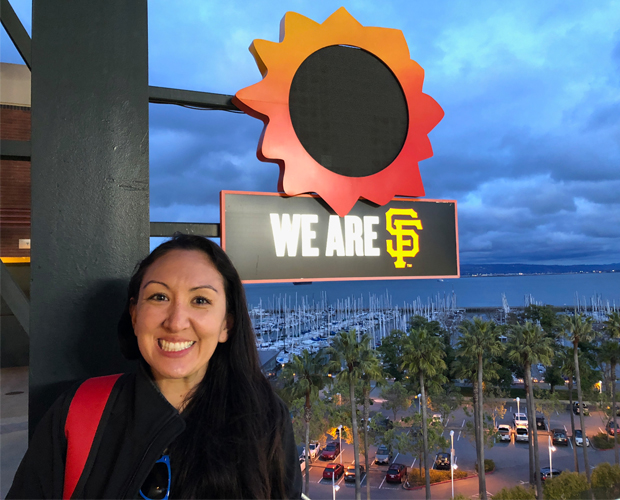Alumni-nominated spotlight: Alisha Tomita-Yu ’16 of Oracle

Alisha Tomita-Yu is by all accounts a trailblazer. She is fascinated by the future of technology, as well as dedicated to ensuring diversity and inclusion in technology and mentoring the next generation of leaders. The GPS alumna, who earned her Master of Advanced Studies in International Affairs in 2016, works as a senior principal program manager at Oracle.
Tomita-Yu has worked with Oracle for 14 years, and serves as the program manager of the Machine Learning and Data Operations Team. Most recently, she has gone beyond her job description to make a positive impact as the policy chair of Oracle’s Diversity & Inclusion Employee Resource Group. She is also actively involved with Oracle’s internship program.
The Bay Area resident has also worked to build bridges as one of the Japanese-American Citizens League’s Kakehashi supervisors, volunteers selected to bring students to Japan to explore their cultural heritage.
“In Japanese, Kakehashi means building bridges,” said Tomita-Yu. “Sharing the cultural experience with the students as a Kakeshashi supervisor and seeing the connection being made between their Japanese-American identities and their ancestral culture was a life-changing experience.”
Read on to learn more about Tomita-Yu’s career highlights, how GPS helped shape her current work and what’s next.
Q: What has been a highlight of your career so far?
A: I was the first female co-chair of my company's Diversity & Inclusion (D&I) Employee Resource Group (ERG), Oracle Pride Employee Network (OPEN LGBTQ+). After my term ended, I transitioned into the public policy chair for the group. This month, our entire management team will attend a training on “Managing Unconscious Bias,” in part because of the great work of D&I. I could never have imagined this 14 years ago when I started.
Q: What is your most memorable class at GPS?
A: I have so many memorable classes and professors from my two years at GPS! The most surprising class was my capstone with Professor Roger Bohn. The assignment was on a topic related to the future of technology. My team exhaustively researched the topic of microtasking and whether it would be transforming the workforce we know today. I knew nothing about the topic before the capstone and six months after graduation, I found myself in a new role as a data program manager for machine learning. I now manage projects with two of the suppliers we researched in our capstone. I only regret that we didn't pursue publishing our paper per Professor Bohn's recommendation because I reference our research or logic all the time when comparing machine learning or data science-related projects.
Q: If you could go back to GPS as a professor or special guest lecturer, what would you like to teach?
A: I would teach a case study or a course on data governance and/or data fairness. My current passion area is bias and fairness in machine learning. At GPS, you learn a lot about data and the power of big data, but data governance and data fairness is a very new subject for anyone to think about. Considerations include: How is my personal information being used? What can you tell about me from my digital footprint? How is AI biased? What policies and regulations are in place to protect my data?
Q: What did you learn at GPS that has been most useful in your career?
A: "Correlation does not imply causation," has stuck with me post-graduate school. I can't tell you how many times we look at the data and have said this exact statement, along with "garbage in = garbage out."
Q: What has been a memorable travel experience since you graduated?
A: Japan was my region specialty while earning my master’s at GPS. Because of this and my nonprofit advocacy work with the Japanese American Citizens League, I was selected to be a Kakehashi supervisor in 2018. The Japan Foundation sponsors the “KAKEHASHI Project – The Bridge for Tomorrow” as part of the Youth Exchange Program with North America promoted by the Ministry of Foreign Affairs of Japan. We took 90+ Japanese-American students on a cultural tour of Japan with a visit to Prime Minister Abe's residence. We also got to stay in Fukushima prefecture and learn about the resilience of communities after the 2011 Tohoku Earthquake.
Q: What do you miss the most about your days at GPS?
A: I miss my peers and professors. One of the most significant advantages GPS has over many other programs is the diversity of its candidates’ backgrounds. I was fortunate to have met and learned from some incredible people. I learned just as much from my peers as I did from my professors.
Q: What’s the best piece of advice you’ve received (professional or personal)?
A: Take risks! It is okay to fail!
Q: Who would you like to pass the pen to and why?
A: Jessica Keegan! Jessica is living the life of a true global citizen and democracy leader. Since graduation, she has lived in Cambodia, Mongolia, Zimbabwe and now Kenya.

